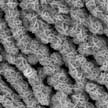
Researchers have successfully produced durable antiviral surfaces that inactivate SARS-CoV-2 within 6 hours. In contrast, on various non-nanostructured surfaces or smooth surfaces, the SARS-COV-2 virus remained viable for up to 48 hours. These results provide evidence that surfaces that are structured with specific nanoscale surface features are effective in preventing SARS-CoV-2 and the subsequent environmental spread. Such nanostructured surfaces can be used in hospital environments and can be extended to other industrial sectors and public infrastructure such as transportation, where fomites or contaminated surfaces are carriers for viral infections.
